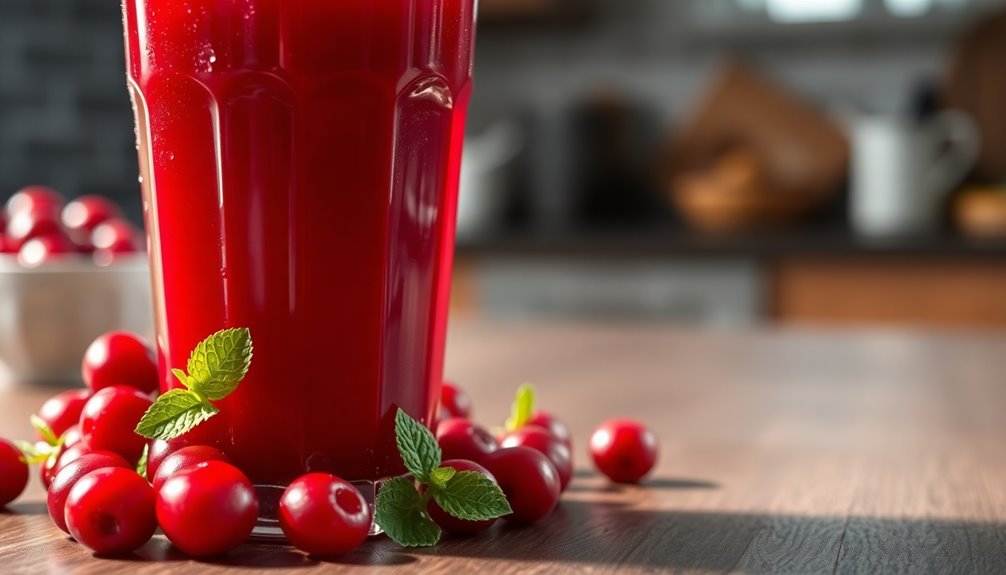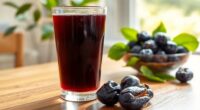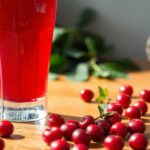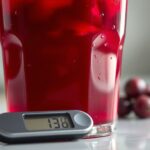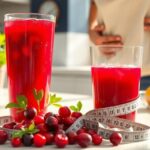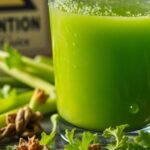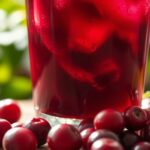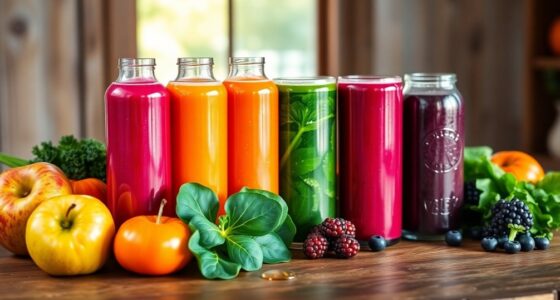Before you sip on cranberry juice, be aware of some potential side effects. Excessive consumption can lead to gastrointestinal discomfort and blood sugar spikes, especially for diabetics. If you're on blood thinners, the juice might increase bleeding risks. Those prone to kidney stones should limit their intake due to its high oxalate content. It's best to stick to unsweetened varieties. Knowing these factors can help you make informed choices, so there's more to discover about cranberry juice benefits and precautions.
Key Takeaways
- Excessive cranberry juice consumption can lead to gastrointestinal discomfort, including upset stomach and diarrhea.
- High sugar content may cause blood sugar spikes, posing risks for diabetics and pregnant women.
- Cranberry juice can increase bleeding risk for individuals on blood-thinning medications.
- It may reduce the effectiveness of certain antibiotics, like amoxicillin, requiring careful monitoring.
- Individuals with kidney stones should limit intake due to high oxalate content in cranberry juice.
Understanding Cranberry Juice and Its Nutritional Profile
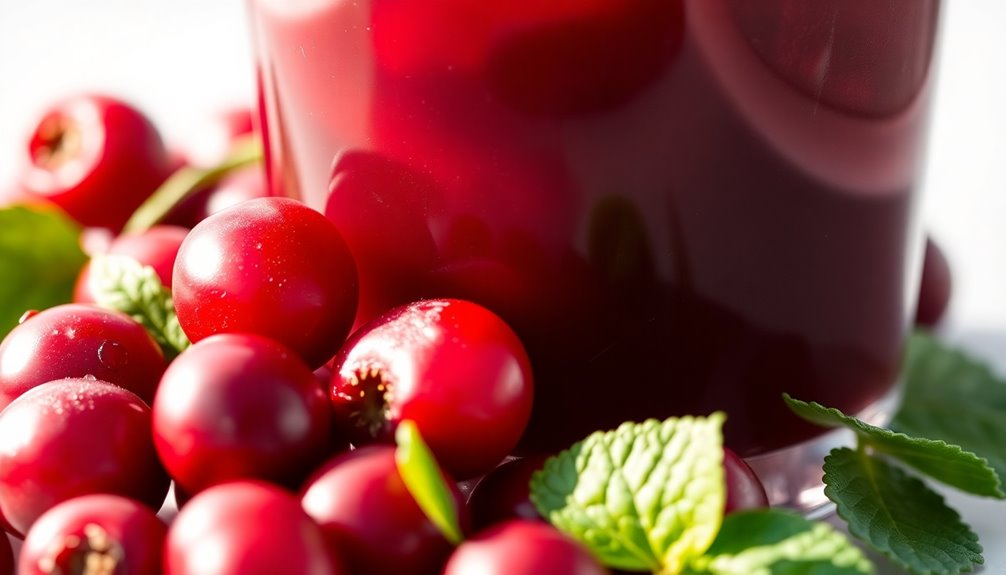
Cranberry juice packs a punch when it comes to nutrition. This tart beverage offers significant nutritional value, delivering 26% of your daily vitamin C needs in just an 8 oz serving, along with 20% of your daily vitamin E.
It's also rich in antioxidants, including anthocyanins and proanthocyanidins, which can support your immune system and speed up healing. However, keep in mind that the juice is low in fiber compared to whole cranberries.
With about 46 kcal and 12.2 grams of carbohydrates per 100 grams, it's essential to monitor the sugar content, which is about 12.1 grams. Additionally, cranberry juice may help reduce the risk of certain diseases, including heart disease.
If you're prone to kidney stones or take blood thinners, consult your healthcare provider before enjoying cranberry juice for its health benefits.
Potential Health Benefits of Cranberry Juice

Packed with nutrients and antioxidants, cranberry juice offers a variety of potential health benefits that make it more than just a rejuvenating drink.
The high vitamin C content supports your immune health and skin importance, providing 26% of your daily allowance in an 8 oz serving. Antioxidants like anthocyanins and proanthocyanidins may enhance heart health by lowering cholesterol levels and reducing arterial plaque buildup.
Regularly sipping cranberry juice can also help prevent urinary tract infections (UTIs) by inhibiting E. coli adhesion to bladder cells. Additionally, its flavonoid content promotes digestive health by reducing harmful gut bacteria.
Moderate consumption is linked to lower cardiometabolic risk markers, including blood pressure and triglyceride levels, especially in women. Furthermore, cranberry juice can be a low carb high protein breakfast option when combined with Greek yogurt for a nutritious start to your day.
Side Effects of Excessive Cranberry Juice Consumption
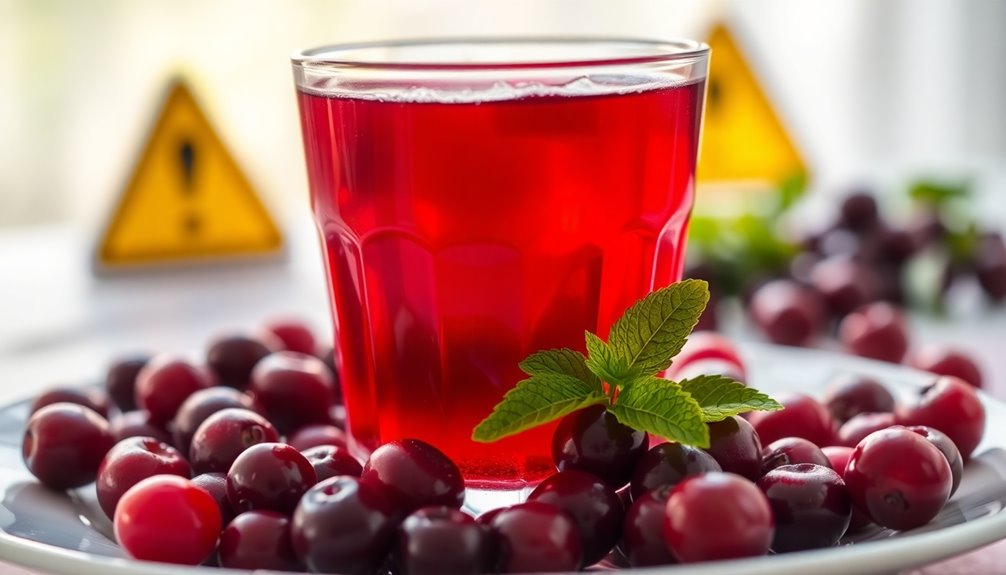
If you drink too much cranberry juice, you might experience gastrointestinal discomfort, like an upset stomach or even diarrhea.
Additionally, the high sugar content in sweetened varieties can cause blood sugar spikes, which is especially concerning for those managing diabetes.
It's important to keep these potential side effects in mind when enjoying your favorite beverage. Consuming excessive amounts of certain fruits, like grapes for dogs, can also lead to serious health issues.
Gastrointestinal Discomfort Risks
While many enjoy the invigorating taste and health benefits of cranberry juice, consuming it in excess can lead to gastrointestinal discomfort. This discomfort may manifest as mild stomach upset or even diarrhea, especially if you're sensitive.
The sugar content in sweetened varieties can cause blood sugar spikes, which may further exacerbate digestive disturbances for those with diabetes or insulin sensitivity. Additionally, cranberry juice's high oxalate content poses a risk for individuals prone to kidney stones, potentially intensifying gastrointestinal issues.
To avoid these adverse effects, it's essential to enjoy cranberry juice in moderation. Monitoring your intake can help you relish the benefits without facing the unpleasant consequences of excessive consumption.
Blood Sugar Concerns
Excessive cranberry juice consumption can raise significant blood sugar concerns, particularly for those managing diabetes. The high sugar content in sweetened varieties can lead to spikes in blood sugar levels, potentially causing hyperglycemia.
With around 12.1 grams of sugar per 100 grams in unsweetened juice, it's essential to be mindful of your intake. Drinking more than one 8 oz glass daily isn't recommended, as it may result in elevated glucose levels.
Always check labels for sugar content and consider low-sugar options to help manage your blood sugar. If you regularly enjoy cranberry juice, monitoring blood sugar levels is important to prevent complications related to diabetes. Additionally, cranberry juice is rich in antioxidants that can support overall health, but it's crucial to balance its consumption.
Stay informed about your consumption limits to maintain ideal health.
Interactions With Medications
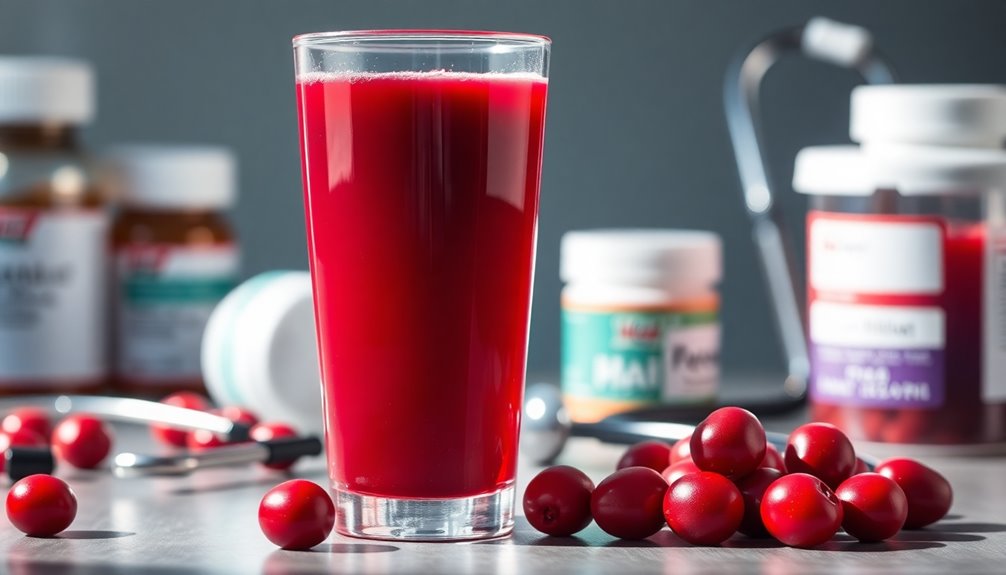
Cranberry juice can markedly interact with various medications, making it essential for you to be aware of these potential effects. If you're taking blood-thinning medications like warfarin, cranberry juice could increase your bleeding risk, so you should consult a healthcare provider. It can also affect the metabolism of drugs such as cyclosporine and antibiotics like amoxicillin, possibly reducing their effectiveness. Additionally, if you're on midazolam or tizanidine, monitoring intake is vital to avoid adverse reactions. People with aspirin allergies should steer clear of cranberry juice due to its salicylic acid content. Furthermore, just as with the need for robust contingency plans during unforeseen events, being proactive about medication interactions can help you avoid health risks.
| Medication Type | Interaction | Recommendation |
|---|---|---|
| Blood-thinning | Increased bleeding risk | Consult a healthcare provider |
| Antibiotics | Reduced effectiveness | Discuss with doctor |
| Midazolam/Tizanidine | Adverse reactions | Monitor intake |
| Aspirin allergies | Trigger similar reactions | Avoid cranberry juice |
Risks for Individuals With Specific Health Conditions
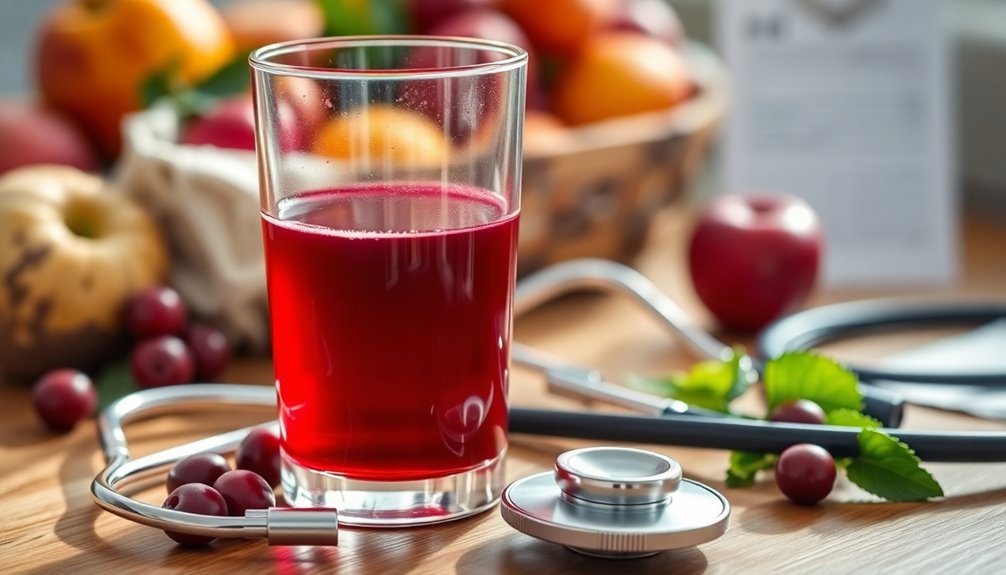
If you have certain health conditions, it's crucial to be mindful of the risks associated with cranberry juice.
Individuals with diabetes should be cautious due to its sugar content, which can spike blood sugar levels, especially in sweetened varieties.
If you're prone to kidney stones, limit your intake, as the juice's acidity and high oxalate content can worsen your risk.
Pregnant and breastfeeding women are advised to avoid cranberry juice, given the lack of safety data during these times.
If you're allergic to aspirin, steer clear of cranberry products due to salicylic acid, which may trigger similar reactions.
Finally, consult your healthcare provider if you take blood-thinning medications like warfarin, as cranberry juice can increase bleeding risks.
Cranberry Juice and Urinary Tract Infections (UTIs)

While many people turn to cranberry juice for its potential health benefits, it's particularly noted for its role in preventing urinary tract infections (UTIs).
The A-type proanthocyanidins in cranberry juice can help prevent bacteria, particularly E. coli, from adhering to bladder cells, potentially reducing UTI incidence.
However, it's important to remember that cranberry juice isn't a treatment for active UTIs; instead, it may serve as adjuvant therapy for those prone to these infections.
Some studies even suggest it might inhibit Helicobacter pylori growth.
Before using cranberry juice as a preventive measure, you should consult with a healthcare provider, especially if you have existing health conditions or are taking blood thinners. Additionally, it’s important to choose high-quality cranberry juice to maximize its health benefits. You should educate yourself on how to spot bad cranberry juice, as some products may contain added sugars or artificial ingredients that can diminish its effectiveness. Always check the label for pure cranberry juice and avoid those with excessive additives to ensure you are getting the best possible product.
Considerations for Pregnant and Breastfeeding Women

If you're pregnant or breastfeeding, it's important to evaluate the nutritional benefits of cranberry juice alongside its sugar content.
While moderate consumption can be safe and even beneficial, it's best to consult your healthcare provider to ascertain it fits your dietary needs.
Staying informed will help you make the right choices for your health and your baby's health.
Nutritional Benefits Overview
Cranberry juice offers several nutritional benefits that can be particularly significant for pregnant and breastfeeding women.
It's rich in vitamin C, providing 26% of your daily allowance in an 8 oz serving, which supports immune health and skin importance during pregnancy.
The antioxidants in cranberry juice may help ease period cramps and improve vaginal bacteria balance.
While moderate consumption is generally safe, it's wise to consult your healthcare provider before taking cranberry supplements, especially if you're on medications like blood thinners.
Additionally, be cautious, as cranberry juice can raise pH levels, potentially leading to yeast infections.
Awareness of these side effects guarantees you enjoy the benefits while prioritizing your health during this essential time. Chia seeds, known for their digestive health benefits, can be a great addition to your diet to enhance overall well-being.
Sugar Content Concerns
When considering cranberry juice during pregnancy and breastfeeding, it's crucial to be mindful of its sugar content. High sugar levels can lead to blood sugar spikes, raising concerns for pregnant women and those with diabetes.
Furthermore, cranberry juice may increase vaginal pH levels, heightening the risk of yeast infections.
- Limit your intake to one 8 oz glass per day.
- Practice moderate consumption to avoid excessive sugar and gastrointestinal discomfort.
- Consult your healthcare provider regarding potential interactions with medications and salicylic acid.
- Be cautious of its effects on blood clotting.
Keeping these points in mind helps guarantee a safer experience while enjoying cranberry juice during this important time.
Consultation Recommendations
While enjoying cranberry juice can offer some benefits, it's essential for pregnant and breastfeeding women to consult their healthcare provider first.
Moderation is key, especially since cranberry juice's sugar content may raise pH levels, potentially leading to yeast infections for pregnant women. The antioxidants in cranberry juice can help balance vaginal bacteria, but caution is still advised.
Additionally, cranberry juice can interact with certain medications, making it vital to discuss your consumption with a healthcare provider. There's limited research on its effects during breastfeeding, so it's best to seek guidance before adding cranberry juice to your diet. Regular tea consumption has been associated with improved cognitive function, which can be beneficial for overall health.
Prioritizing these consultation recommendations will help you avoid unwanted side effects while enjoying the potential benefits of cranberry juice.
Unsweetened vs. Sweetened Cranberry Juice
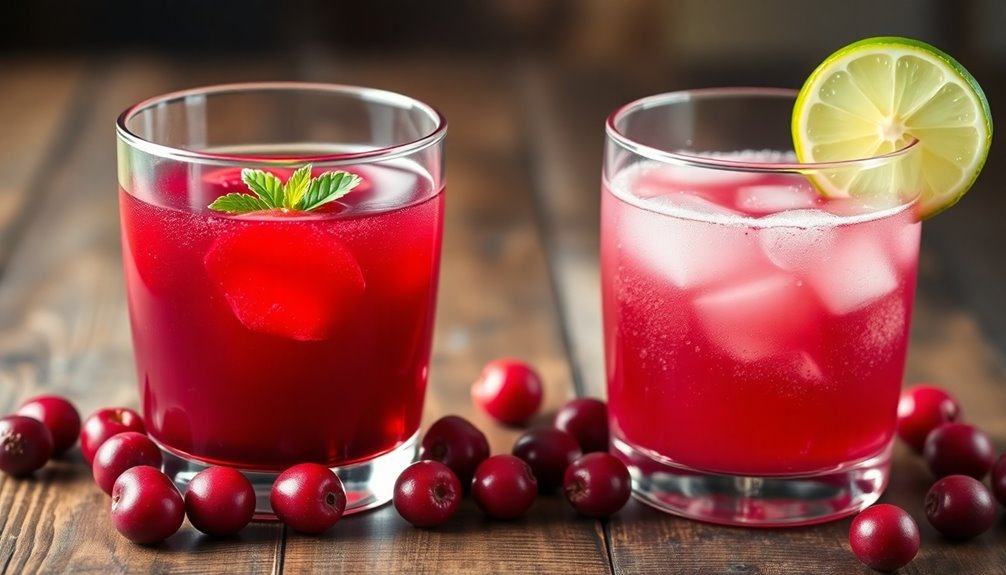
Choosing between unsweetened and sweetened cranberry juice can greatly impact your health and well-being.
Unsweetened cranberry juice offers several advantages:
- Lower calorie content (about 46 kcal per 100 grams)
- Retains more antioxidants and vitamin C
- Contains only natural sugars, avoiding blood sugar spikes
- Less likely to cause gastrointestinal discomfort
On the other hand, sweetened varieties can lead to higher calorie intake and may elevate blood sugar levels, which is especially concerning for those with diabetes.
Additionally, while both types can pose a risk of kidney stones, unsweetened options might be slightly less problematic due to their lower sugar content.
Be mindful of your choice to maximize the health benefits of cranberry juice!
Recommendations for Safe Consumption
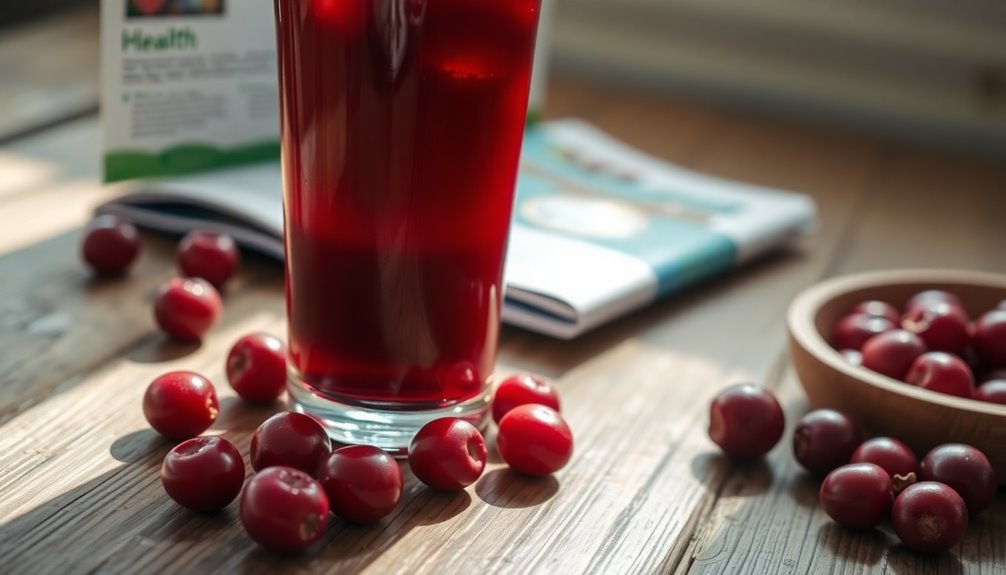
To enjoy the benefits of cranberry juice without the risks, it's important to follow some simple guidelines.
Limit your intake to one 8 oz glass per day to avoid stomach upset and potential spikes in blood sugar, particularly with sweetened varieties.
If you're prone to kidney stones, be cautious due to cranberry juice's acidity and high oxalate content.
Pregnant women and those breastfeeding should seek medical advice before consuming cranberry juice to ascertain safety.
Additionally, if you're taking blood-thinning medications like warfarin, consult with your healthcare provider to prevent harmful interactions.
For individuals with diabetes, keep an eye on your intake since the sugar content can affect your blood sugar levels.
Moreover, consuming cranberry juice may have benefits for digestion, which can further enhance your overall health.
Stay informed for safe consumption!
Frequently Asked Questions
What Are the Side Effects of Drinking Cranberry Juice?
Drinking cranberry juice can lead to a few side effects. You might experience mild stomach upset or diarrhea, especially if you consume it in large amounts.
If you're opting for sweetened varieties, be cautious of blood sugar spikes. The juice's acidity could increase the risk of kidney stones if you're prone to them.
Additionally, if you're allergic to aspirin, it's best to avoid it due to its salicylic acid content. Always consult your doctor if you're on blood thinners.
When Should You Not Drink Cranberry Juice?
You should avoid cranberry juice if you're allergic to aspirin, as it contains salicylic acid.
If you have diabetes, be cautious, since it can spike your blood sugar levels, especially in sweetened forms.
Limit your intake if you've had kidney stones, due to its acidity.
Pregnant or breastfeeding? Consult your healthcare provider first.
Finally, if you're on blood thinners like warfarin, it's best to steer clear, as it might interfere with your medication.
Is Cranberry Juice Good for Vaginal Health?
Cranberry juice can be beneficial for your vaginal health. It helps maintain a balanced vaginal microbiome, potentially lowering the risk of yeast infections by reducing pH levels. Additionally, cranberry juice is packed with antioxidants, which can further support overall health and immunity. Regular consumption may also aid in preventing urinary tract infections, a common concern for many women. Recognizing the cranberry juice health benefits for women can lead to better-informed lifestyle choices that promote both vaginal and urinary health.
The antioxidants may also ease menstrual cramps, providing comfort during your period. Plus, its high vitamin C content supports your immune health, further protecting against infections.
Just remember to consume it in moderation, as excessive sugar can raise pH levels, possibly increasing yeast infection risks.
Is Cranberry Juice Good for Kidneys and Liver?
Cranberry juice can have mixed effects on your kidneys and liver.
It might help prevent urinary tract infections, but its acidity and high oxalate levels can increase the risk of kidney stones if you're prone to them.
While moderate consumption supports liver health due to antioxidants, it's crucial to consult a healthcare provider if you have existing liver conditions.
Always monitor your intake to avoid potential strain on these important organs.
Conclusion
In summary, while cranberry juice offers numerous health benefits, it's essential to enjoy it in moderation. You might think that more is always better, but excessive consumption can lead to unwanted side effects and potential interactions with medications. By being mindful of your intake and considering your individual health needs, you can safely reap the rewards of this tart beverage. So go ahead and sip, but remember: balance is key for your well-being!
Cindy thoroughly researches juicing trends, techniques, and recipes to provide readers with practical advice and inspiration. Her writing style is accessible, engaging, and designed to make complex concepts easy to understand. Cindy’s dedication to promoting the advantages of juicing shines through her work, empowering readers to make positive changes in their lives through the simple act of juicing.

